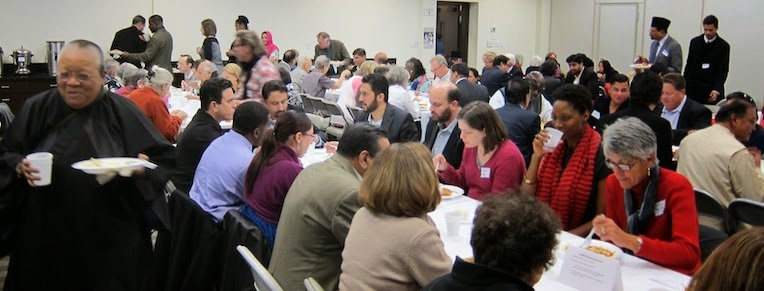
I think most christians are ambivalent, or even a little wary, about interfaith dialogue. It seems to compromise the truth of the gospel somehow.
But it needn’t.
Joint Declaration of Religious Leaders Against Modern Slavery
A recent initiative of the Global Freedom Network led to a much publicised joint declaration of religious leaders against modern slavery.
This surely would be one form of interfaith cooperation that few christians could feel unhappy about.
National Day of Unity?
Greg Lake recently reported on a press conference held in Sydney where Christian, Jewish and Muslim leaders called for a National Day of Unity, as a respopnse to tensions and sometimes open hostility directed towards Australia’s Muslim community. On that day, mosques were open and welcoming visitors, and marches were organised by interfaith community group, Welcome to Australia.
Greg suggested that more christian leaders should have supported the Day. He recognised the dilemmas faced by christians on such a day, but suggested “it is into a climate of fear and uncertainty that God calls his people to go.”
He referred to the abuse that some Muslims receive from Australians of European descent, and said: “Just as Jesus stood beside those who were relegated to the outer circles of a community, so I am called to stand with the vulnerable in love.”
Interfaith meeting in Houston
We recently visited Houston in the USA. While there, we had the opportunity to attend an interfaith meeting and dinner held at a Jewish centre. It was just before the US Thanksgiving holiday, and the theme was therefore giving thanks.

In the meeting, leaders from 7 different religions (In order from left to right: Muslim, Hindu, Christian, Zoroastrian, Sikh, Buddhist and Jewish) spoke of how their religion would give thanks, each also giving a short reading from their scriptures and/or a short prayer.

Afterwards at the dinner, followers of the seven faiths mingled and conversed. We sat with two Jewish women and a female Buddhist priest.
What did it prove, what did I learn?
- There were many things shared by the leaders which we christians could agree with. This doesn’t mean I could endorse everything, but it showed that christians shouldn’t think that other religions are totally wrong, for where we agree, we should be happy to recognise the truth we both hold. But it does mean there are many matters on which we can find common cause.
- There were many cultural differences that are not important, but were interesting to me. For example, most of the other religious leaders were wearing special clothing – only the Jews had adapted to American/English style clothing. All the other religions used chants in their prayers or readings, meaning the Protestant form of Christianity presented seemed the most informal (to me at any rate).
- Most of us live in pluralistic societies, and the peaceful running of our societies depends in part on avoiding religious conflict. Attending events like this increases understanding and makes a small public stand against intolerance.
- It was enjoyable to meet and talk with people of other religions and to learn what is important to them.
Compromising the gospel?
I still believe Jesus’ command to make disciples of all nations is relevant for us today. And I still believe that christianity has important truths (mostly about Jesus) that other religions don’t have. But I also believe the grace of God is bigger and wider than we can understand.
So I still want to share my faith, and the reasons why I believe, with those who are not yet following Jesus. But I don’t want to do it from an imagined position of superiority or in an attitude of confrontation. And I want to recognise where people share truths that I believe in, and where the Spirit of God may already be working.
I don’t think this is compromising the gospel. Most of us live or work amongst non-christians, and there are practical limits on how much we can talk about Jesus. Often we have to wait and pray for opportunities before we can share what is dear to us. Mixing with people of other faiths in an interfaith gathering is really not very different.
Certainly, to take a colourful expression from Dean Sherman, my salvation didn’t leak out all over the floor just because I attended this meeting. I would happily go again.
The bottom line?
It seems to me there are interfaith activities I am comfortable attending, and others I might not. If the gathering celebrates commonalities or shares differing perspectives without pretending we all agree, I don’t feel threatened. If it is aimed at promoting harmony and common cause in our pluralist communities, I am all for it. But if it suggests that all religions are the same or equally valuable, I think that is an insult to the believers of all religions and a viewpoint I cannot accept.
Top photo: Global Freedom Network. Other photos: unkleE.
Bravo! Reading this made me smile. And God too, I think. 🙂